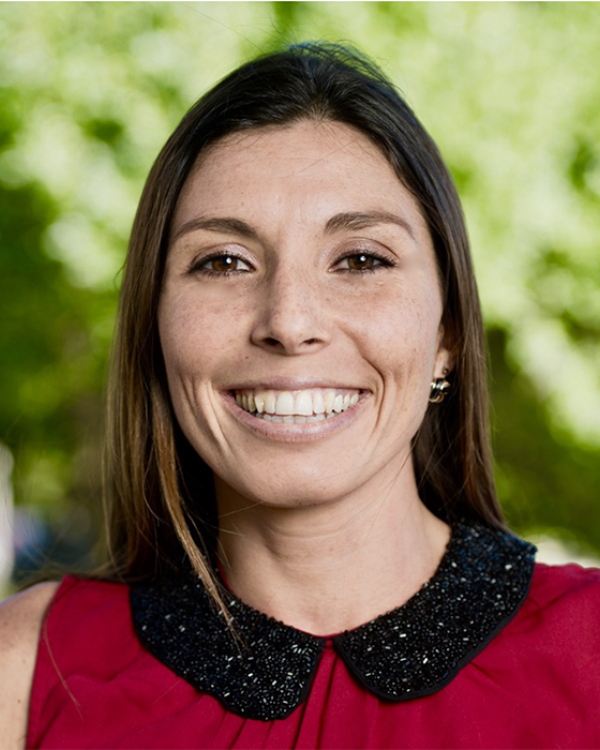
Estefanía Pihen González (she/her), third year Ph.D. student at the Gevirtz Graduate School of Education, specializes in education for sustainable development (ESD), an educational framework that infuses academic curriculum with positive, hopeful lessons in sustainability. Pihen González’s current area of study is an amalgamation of the many degrees she has earned throughout her diverse education—first a Bachelor of Science in marine biology from her home country, Costa Rica, next a Master’s degree in social entrepreneurship from Colorado State University, and finally another Master’s in education from the Gevirtz School—all preparing her for the imperative Ph.D. research she now does in sustainability and accessible education.
“I took a different route than most students,” Pihen González explains. “I took a decade and a half between my master’s and Ph.D. program, working in the field, validating my expertise.” And she made that time well worth it: Estefanía began work with a marine-conservation institute shortly after graduating, which engendered her interest in the union of quality education and environmental conservation. This work led her to open a K-12 school for lower-income families in Costa Rica. “We sponsored 80% of the students,” she proudly states, “in order to educate and empower the many communities that were facing unsustainable touristic development.”
Pihen González’s team implemented progressive curriculum in the classroom, incorporating conversations about social equity and environmental agency into the required academic curriculum. It was within this work, Pihen González explained, that she found her calling for education in sustainable development, a field prevalent in nations like Finland, New Zealand, and Germany. While last year many countries signed the Declaration of Berlin, which committed over 2,000 ministers of education and politicians to use ESD as their national curriculum-shaping framework, its use is rare in U.S. schools, for now.
Estefanía emphasizes the importance of delivering sustainability information in a positive, hopeful light, cultivating innovation, curiosity, and empathy (agents for change) as opposed to focusing on climate disasters. “Because when you're fifteen and you hear about the state of the world, you kind of freak out, right?” Estefanía reasons. “I’ve had first graders telling me that they learned about climate change and now worry that the world is going to end. Students suffer from eco-anxiety. So, it's really important that we implement these lessons that give these students the tools and the power to make a change. We show them that there's hope that they can be that engineer, that writer, that artist that they want to be.”
Fast forward to her Ph.D. research today: Estefanía still has the same mission. Her current work centers around answering the difficult question: How can we effectively train U.S. educators to incorporate sustainability and equity lessons into academic curriculum while meeting state standards for core subjects? Pihen González uses supplemental field work to help find the answer. Aided by her Master’s degree in social entrepreneurship, Estefania started an educational company that works on projects all over the world, helping schools transition toward the ESD framework by training teachers to marry national standards and sustainability education.
“We basically grab the curriculum that already exists—math, science, social studies—and reshape it to include content pertinent to sustainability education,” Estefanía explains. “And that doesn't only mean environmental education…that includes the social, political, and cultural components of sustainability, too.” Pihen González’s team works with multiple schools helping teachers incorporate local environmental issues into the classroom.
The hope is to have teachers cover all the content that their principals expect of them, and at the same time support them to design lessons that engage students in learning about and for local sustainable issues. “For example, the local gas company in Ventura is trying to expand the pipe going under an elementary school, situating dangerous materials underneath elementary schoolers,” Pihen González says. “So I train the teachers, asking them, ‘How can we use topics in mathematics or language arts as anchors for teaching students about local problems, like this one with the gas company?’”
In addition to this curriculum development, she also works with the environmental education program LEAFY, which is currently connecting prospective teachers from GGSE’s Teacher Education Program with kids that attend the Santa Barbara Boys and Girls Club, facilitating environmental education to keep Santa Barbara county students informed about their area’s natural environment and the importance of protecting it.
Pihen González remains as passionate as ever about sustainability education, dreaming that one day the U.S. will embrace ESD as our national framework and implement powerful, relevant lessons into academic curriculum, helping younger generations acquire the skills and knowledge necessary to face the social and environmental issues of the future.